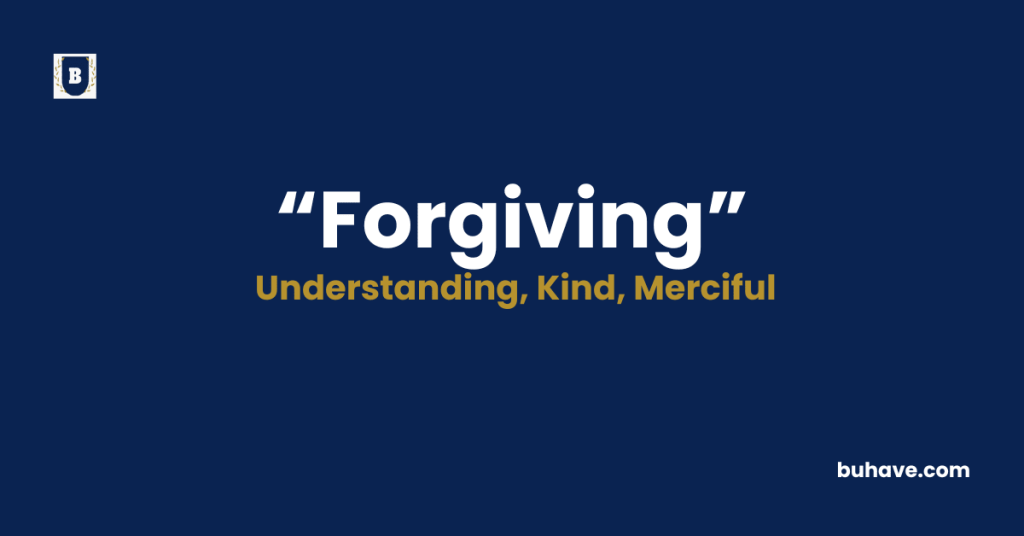The word ‘Forgiving’ (Adjective) describes someone who chooses to let go of anger, resentment, or the desire for revenge after someone else has done wrong. in this guide, you’ll learn the full definition, synonyms, antonyms, etymology, and real-life examples of how to use ‘Forgiving’ correctly in sentences.
Forgiving Explained in Depth
A complete and detailed guide to the words Forgiving including meaning, definition, examples, etymology, synonyms, and antonyms.
Meanings of Forgiving
Forgiving” describes someone who chooses to let go of anger, resentment, or the desire for revenge after someone else has done wrong. First of all, a forgiving person focuses on healing and moving forward rather than holding on to past mistakes.
Moreover, this quality involves understanding that people make errors and that relationships grow stronger through patience and compassion. In addition, forgiveness often brings peace not only to the one who forgives but also to the person being forgiven. As a result, being forgiving helps build trust, reduce conflict, and improve emotional well-being.
Therefore, when someone acts forgiving, they show strength, maturity, and empathy instead of seeking punishment or blame.
Definition:
Forgiving is choosing to release negative feelings such as anger, hurt, or resentment—after someone has caused harm or made a mistake. First of all, a forgiving person doesn’t ignore what happened, but they decide to move forward without holding a grudge.
Moreover, forgiveness often reflects emotional strength and a desire to restore peace in a relationship. In addition, forgiving someone can help the forgiver feel lighter, less stressed, and more in control of their emotions. As a result, this word describes not just a kind act toward others but also a healthy decision for one’s own well-being.
Therefore, to be forgiving is to act with compassion, maturity, and a sense of emotional freedom.
Etymology:
The word “forgiving” comes from the verb “forgive,” which has deep roots in early English and Germanic languages. First of all, “forgive” developed from the Old English word forgiefan, which meant to give up, grant pardon, or excuse a fault. Moreover, this word combines “for–,” meaning completely, and “giefan,” meaning to give—so originally, it meant “to give completely” or “to release fully.” In addition, related forms appear in other Germanic languages, such as Old High German (firgeban) and Gothic (fragiban), all suggesting a strong connection to giving, letting go, or showing mercy.
As a result, over time, “forgiving” came to describe a person’s ability to let go of bitterness and choose empathy. Therefore, the word’s history reflects a long tradition of generosity, release, and emotional strength.
Example Sentences:
- First of all, she chose to be forgiving because she valued peace more than holding a grudge.
- Moreover, his forgiving nature helped repair friendships that others might have given up on.
- In addition, the teacher remained forgiving even when her students made repeated mistakes.
- As a result of his forgiving attitude, their relationship grew stronger and more honest.
- Therefore, instead of reacting with anger, she responded with a forgiving smile that calmed everyone down.
Forgiving Synonyms:
- Understanding
- Compassionate
- Tolerant
- Merciful
- Kindhearted
- Lenient
- Patient
- Accepting
- Sympathetic
- Big-hearted
Forgiving Antonyms:
- Vindictive
- Resentful
- Unforgiving
- Merciless
- Spiteful
- Cruel
- Harsh
- Impatient
- Grudging
- Revengeful
FAQs about Forgiving
Here’s a FAQ-style guide about the word “Forgiving”
1. What does “forgiving” mean?
“Forgiving” is an adjective (and also the present participle of the verb forgive) that describes:
- A person who is willing to pardon others for mistakes, offenses, or wrongdoings.
- A generous or compassionate attitude toward those who have caused harm.
- Sometimes used metaphorically (e.g., a “forgiving” schedule or material).
2. How is “forgiving” used in a sentence?
- “She is a forgiving person who doesn’t hold grudges.”
- “His forgiving nature helped heal the family’s conflict.”
- “The trail is forgiving for beginner hikers.”
3. Is “forgiving” always about people?
No, while it often refers to a person’s character, it can also describe:
- Environments or conditions that are tolerant or easy (e.g., “forgiving terrain”)
- Schedules or systems that are flexible or accommodating
4. What are some synonyms for “forgiving”?
- Compassionate
- Understanding
- Merciful
- Lenient
- Tolerant
Note: Each has slightly different connotations depending on context.
5. What is the opposite of “forgiving”?
- Unforgiving
- Harsh
- Vindictive
- Resentful
- Strict
These describe people or things less willing to overlook mistakes or faults.
6. Can “forgiving” describe strength?
Yes. Forgiving is often seen as a form of emotional strength rather than weakness. It takes courage, empathy, and self-awareness to let go of resentment or offer a second chance.
7. What’s the difference between “forgiving” and “forgetting”?
- Forgiving means letting go of anger or resentment and choosing not to seek revenge.
- Forgetting means no longer remembering the event.
You can forgive without forgetting—and vice versa.

















